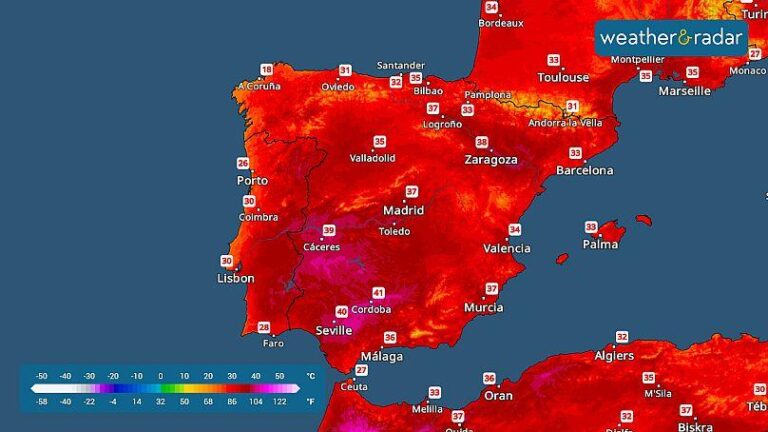Spain is currently enduring its most intense heat wave on record, according to meteorological reports highlighted by The Korea Herald. The extreme temperatures have shattered previous highs, prompting widespread alerts and raising concerns over public health, agriculture, and energy supplies. This unprecedented heat wave underscores the growing impact of climate change on the Iberian Peninsula, as authorities mobilize to mitigate its effects and safeguard vulnerable communities.
Spain Heat Wave Sets New Records with Unprecedented Temperatures
The recent surge in temperatures across Spain has shattered historical records, marking this heat wave as the most intense on record. Cities including Seville, Madrid, and Cordoba experienced prolonged days with temperatures soaring above 45°C (113°F), pushing local infrastructures and communities to their limits. Meteorologists attribute this extreme event to a combination of atmospheric pressure anomalies and climate change factors intensifying the Mediterranean summer heat. Emergency services have been stretched thin as wildfires erupted and power consumption reached unprecedented levels.
Authorities have issued multiple warnings highlighting the severe health risks related to sustained exposure to these extreme temperatures, especially for vulnerable groups such as the elderly and children. Key impacts observed include:
- Record-breaking daily high temperatures lasting for over a week
- Increased hospital admissions for heatstroke and dehydration
- Disruption of public transport and outdoor activities
- Accelerated drought conditions affecting agriculture and water supplies
| City | Peak Temperature (°C) | Date Recorded |
|---|---|---|
| Seville | 46.2 | July 12, 2024 |
| Madrid | 44.7 | July 13, 2024 |
| Cordoba | 45.8 | July 11, 2024 |
Impact on Public Health and Infrastructure Raises Urgent Concerns
The unprecedented heat wave sweeping across Spain has placed immense strain on the nation’s public health system and critical infrastructure. Hospitals reported a surge in heat-related illnesses, including dehydration, heatstroke, and respiratory complications, disproportionately affecting vulnerable groups such as the elderly and children. Emergency services are stretched thin as the demand for medical attention rises sharply. Public health officials are urgently calling for increased awareness and preventive measures to mitigate further casualties.
Beyond the health sector, infrastructure resilience is under severe threat. Key disruptions include:
- Power grid failures driven by soaring electricity consumption for air conditioning.
- Transportation delays caused by warped railway tracks and road surface damage.
- Water shortages as reservoirs dwindle under sustained high temperatures and evaporation.
| Sector | Reported Issues | Current Response |
|---|---|---|
| Healthcare | 30% increase in heatstroke cases | Mobile cooling centers opened |
| Energy | Grid load peaks exceeding 15 GW | Rolling blackouts implemented |
| Transport | Rail slowdowns and road buckling | Speed restrictions enforced on tracks |
Experts Advise Immediate Measures to Mitigate Heat Risks and Enhance Preparedness
In response to the unprecedented intensity of the recent heat wave sweeping across Spain, specialists are urging authorities and citizens alike to adopt swift interventions aimed at reducing health hazards and bolstering community resilience. Key recommendations include expanding shaded public spaces, increasing the availability of cool water stations, and implementing early warning systems to alert vulnerable populations such as the elderly and outdoor workers. Emphasizing collaborative action, experts underscore the importance of integrating heat risk management into urban planning and emergency response frameworks.
Critical measures advised to mitigate the impact of soaring temperatures are summarized below:
- Enhance public awareness campaigns focusing on heat illness prevention and hydration.
- Deploy mobile cooling units in high-risk neighborhoods lacking green spaces.
- Coordinate with healthcare services to prepare for increased heat-related admissions.
- Encourage flexible working hours to avoid peak heat periods for outdoor laborers.
| Immediate Actions | Purpose |
|---|---|
| Install Urban Greenery | Reduce surface temperatures by providing natural shade |
| Heatwave Alert Systems | Enable timely warnings to vulnerable populations |
| Community Cooling Centers | Offer refuge during extreme heat events |
| Hydration Stations | Prevent dehydration in exposed outdoor areas |
Future Outlook
As Spain continues to grapple with what experts are calling the most intense heat wave on record, concerns over climate change and its impacts on public health, agriculture, and infrastructure remain at the forefront. Authorities urge residents to take necessary precautions as temperatures persist at unprecedented levels. The unfolding situation underscores the urgent need for comprehensive strategies to mitigate the effects of extreme weather events in the future.




